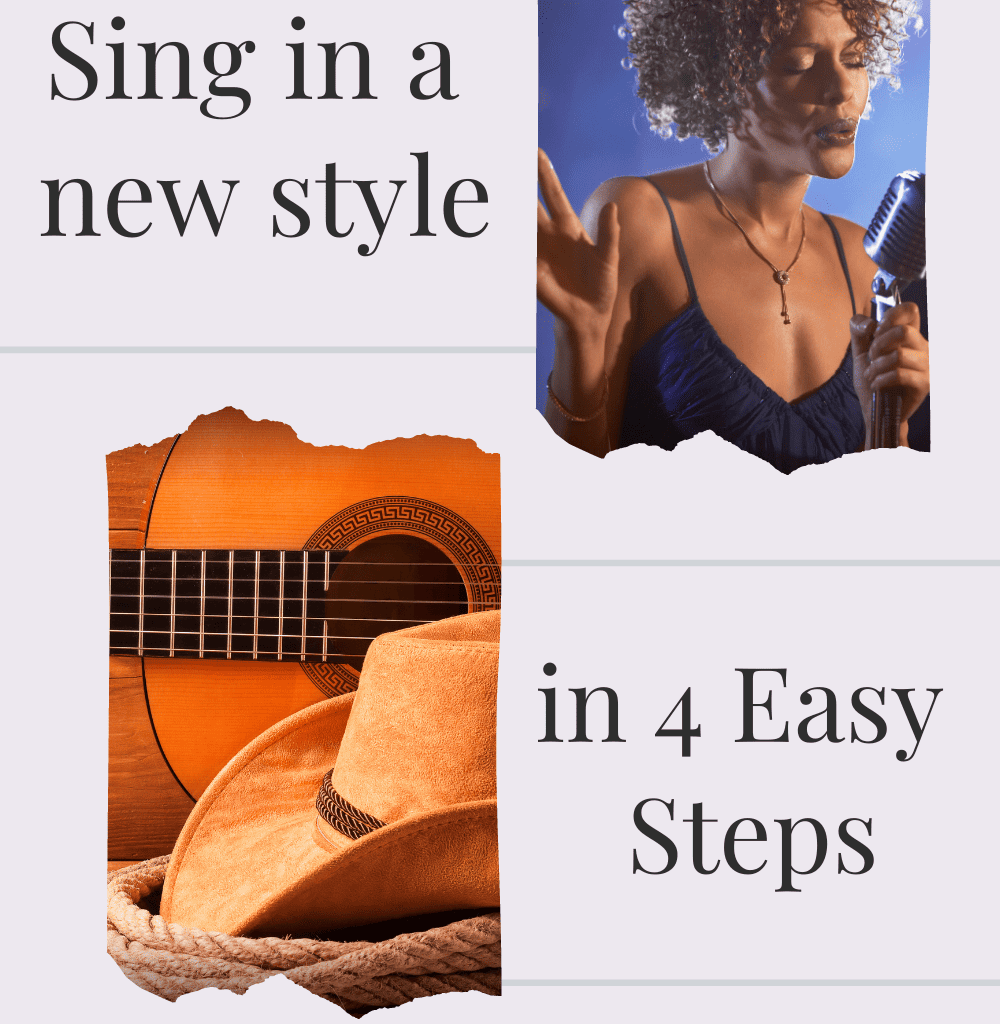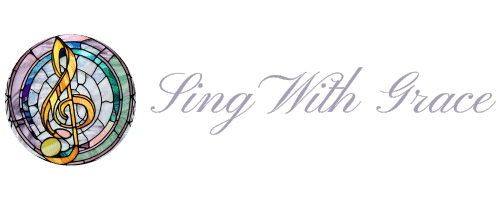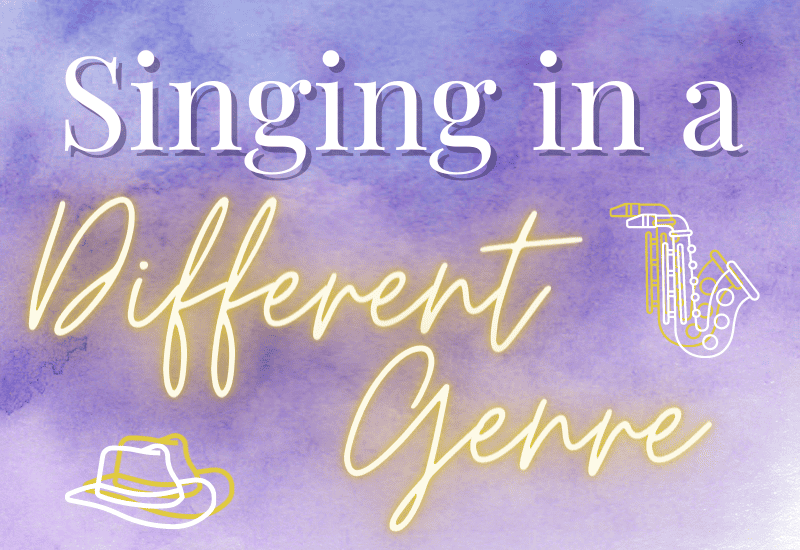As you may or may not already know, my husband Caleb is a fantastic country singer-songwriter. Yes, I am biased. No, I am not exaggerating when I say he has an excellent voice for the country genre and an even greater skill at utilizing his voice over multiple genres!
Though his professional gigs are solo / small band country gigs with him as lead singer, he also excels at choral tenor parts at the Holy Sacrifice of the Mass and swingin’ jazz tunes back at Texas A&M.
So how then, since his main genres of interest are country, jazz, and Catholic chant, did Caleb record the Jeremy Jordan classic “This World Will Remember Us” from the musical Bonnie & Clyde?
How can a singer learn to sing different genres of music?
Step 1: Familiarize yourself with the new genre
When I was about to enter my freshman year of college at Texas A&M, I knew that I wanted to continue performing somehow. Unfortunately (you can read more about all this here) A&M doesn’t have a theatre department and does not put on musicals.
My whole singing career up to that point consisted of musical theatre and church singing, but I knew I had to switch gears if I wanted to perform.
I heard from my boyfriend at the time that the University Jazz Band director was looking for a female singer. I had never sang nor really listened to jazz in my life, so I desperately needed to start listening to the genre if I wanted a chance at getting into the band!
For a singer learning a new genre of music, start by listening to the classics.

For jazz, it wasn’t hard to figure out who the staples singers of the genre were: Frank Sinatra, Ella Fitzgerald, Billie Holiday, Nat King Cole, etc.
Not only were there classic singers in the jazz genre, there are also entire music books dedicated to “jazz standards.” In the genre of country music this is your George Straits and Johnny Cashs. In musical theatre, this is your Rodgers and Hammerstein and Sondheim.
I created a jazz genre playlist and began singing along. After all, the best way to learn a new genre is to actually sing in that new genre’s style!
Step 2: Pick one genre standard song to work up
Once you’re familiar with the stylistic trends in a genre like:
- Type / use of vibrato
- Accent or specific pronunciations (if someone said “I’m going to” in a country song it would seem out of place. “I’m gonna’” is preferable . . . stuff like that.)
- Clean or dirty diphthongs
You’re ready to work on a specific song in that genre.
My song decision was made simple for me. Since I had an audition for the jazz band coming up (and I wanted to choose the songs that best showcased my voice) I picked a ballad and an uptempo. “Moonlight Serenade” Ella’s style and “As Long As I’m Singin’” in Natalie Cole’s style.
I started with the uptempo piece because its jazz style is similar in a lot of ways to certain musical theatre songs. (That’s the cool thing about musical theatre as a ‘genre’ . . . it doesn’t actually encompass only one musical genre. “Anything Goes” and “Defying Gravity” are both in a similar category of artistic expression–the singers break into song because they need to express something. But they’re completely different musical genres–jazz showtune versus contemporary showtune.)
Once I got the pitches and words down, it was time to add a little jazziness to it. I pretty much copied Natalie Cole at first–slurring some runs, articulating and accenting others–but when I sang it more and more, I was able to incorporate some of my own turns and add accidentals and such.
Another important aspect of mastering a new genre is your vocal placement!
In opera, you’re going to be more open and searching for that ‘ring,’ but in jazz, you want to be more sultry and oftentimes forward (similar to musical theatre).
For my audition ballad, I needed to focus even more on the actual feel of singing the jazz genre–my vocal placement. Instead of a classical, clearly articulated sound, I needed to let the words f l o a t out.
I changed my normal theatre vibrato to a slower, more lullaby-style. And man figuring this all out was so fun!
Once you’ve really listened to a genre long enough and you’re finally working on a song from your newly chosen genre, it’s incredibly exciting when your brain begins making connections and thinking of stylistic choices you never would’ve before!
Step 3: Find a coach in your new genre to push you to the next level
On a sunny Texas summer day I walked into the old A&M band hall and auditioned for the jazz band director, Mr. Hollar (A moment which would absolutely change the trajectory of my entire life. Joining the jazz band was how I met my husband, Caleb!)
He thought my audition was great and offered me the spot! All the preparation I put into really understanding this new genre paid off. But now I needed to actually perform it with a group of jazz musicians.
Lucky for me, I played saxophone in high school–so I know a thing or two about band rehearsal. I knew my best shot at good productive time rehearsing would be to figure out what songs to sing and take them to my voice lesson teachers and ask for their coaching!
Back when I was preparing for my audition, I did a lot of research into the jazz style. But when learning a new genre, it is priceless to have another person who is knowledgeable in said genre to critique you on the finer points of singing:
- Diction
- Vowel placement
- Register transitions
- Breathiness / extra details!
And MAN I’m so glad I asked them for help. My vocal as well as physical performance was freed up once I understood the direction I was heading.
Here’s a little case study on getting coached in a new genre
The same thing happened last week when Caleb and I were recording our first ‘you sing’ YouTube video.
As a country singer and Texas boy himself, Clyde’s accent was simple for Caleb to grasp. Even so, while coaching him there were a couple of words he was formalizing (simply because he was singing in a new style). This was an easy fix–once I pointed it out, he was able to change his wording.
Another issue we worked through (a very common one in musical theatre) is large pitch leaps across registers. Throughout the chorus, Clyde hops up a 6th on the word “remember.” This happens because Clyde is harmonizing, so it’s not really something that comes up often in the country genre (which mostly utilizes steady 3rds and 5ths as harmonies).
The tendency for single words that have such a large leap is to disconnect the notes (and word) entirely. Re – MEM -ber with the ‘mem’ being higher and louder than the ‘re’ and ‘ber.’
This isn’t very pleasing to the ear, and worse still, it could actually obscure the meaning of the phrase–listeners only registering the ‘mem’ and wondering why it’s so loud and what the singer is saying etc etc.
We worked for a while on achieving a flow in the word ‘remember’ on various pitches until Caleb became more comfortable with it! In the end, Caleb was relaxed and effortlessly hitting the higher note as well as articulating the word so the listeners could understand (and it would sound right as a harmony!)
The first run of Caleb singing “This World Will Remember Us” really wasn’t bad. He read the pitches and the text well. The instrumental provides solid rhythmic backing that heavily influences the singing style. Caleb is a musician, so he intrinsically understands this stuff.
But if you’re really wanting to succeed in a new genre, I highly recommend finding a voice coach who actually knows the genre. If your classical voice coach doesn’t listen to or sing jazz but says they can help you, they’re not going to be able to. You just won’t learn the finesses from someone who isn’t experienced in that genre.
Trust me, I’ve seen it happen too many times. (In the pop culture world, think John Legend in NBC’s Jesus Christ Superstar. He just wasn’t ready to sing a rock musical. Le sigh.)
Step 4: Continue singing in that new genre!
Don’t give up! If at first you hear yourself singing in a different genre and think you sound like a square, that’s completely normal. Singing and performing is all about flexibility and having no tension.
You need to practice your new genre until all of the minute details become second nature to you. Then you can start to have fun with it!
If you’re learning how to sing in a new genre, I hope this post helped you out! If you’d like coaching in musical theatre (all the musical genres that encompasses), jazz, or even country, I’d love to help you out!
Thanks for reading!
Grace

